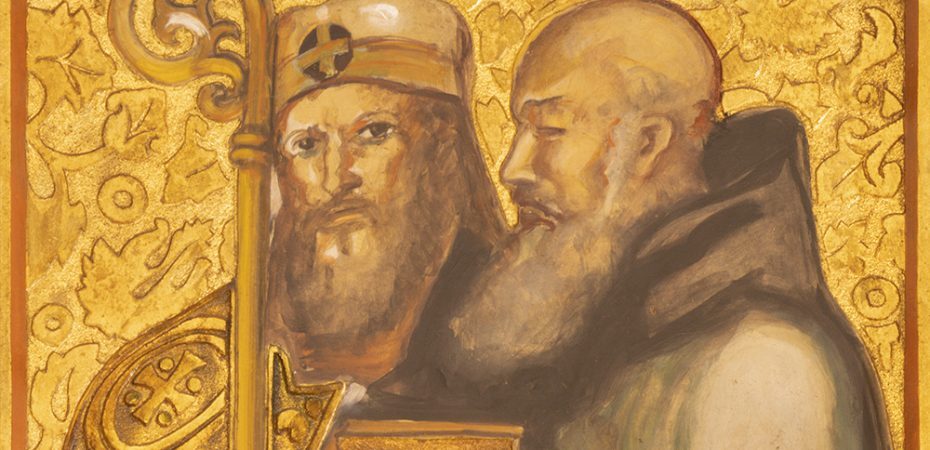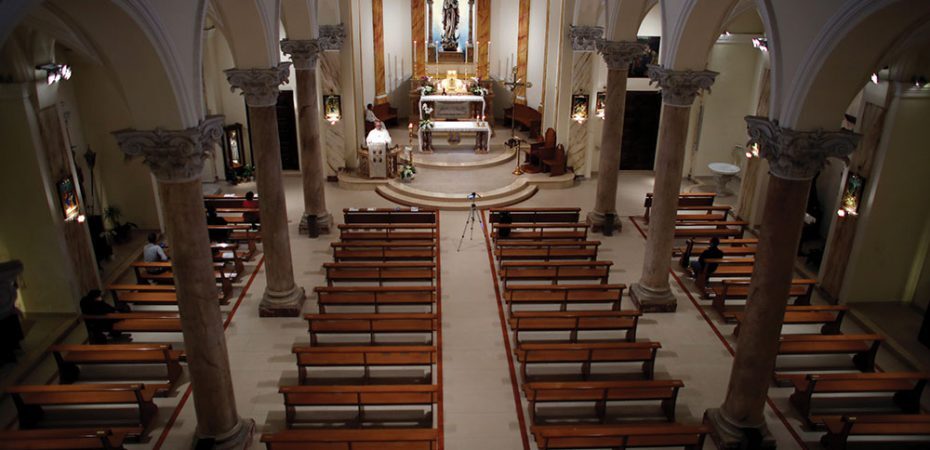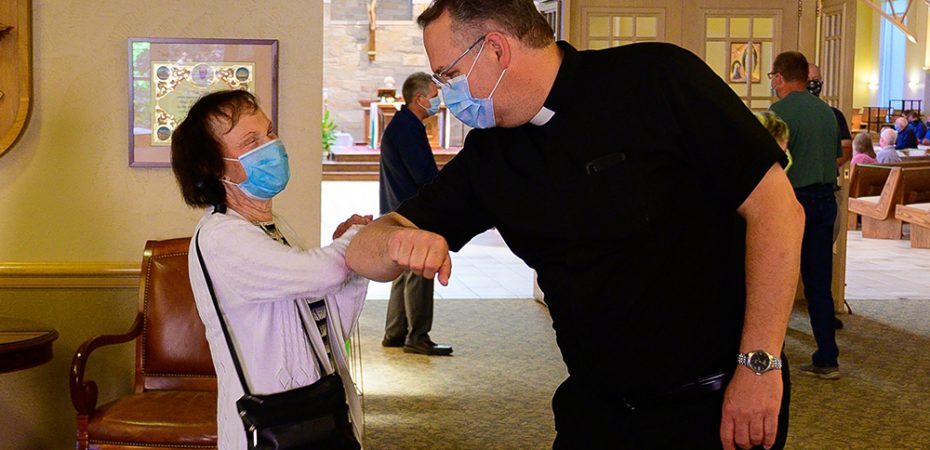Soul Custody
Caring for the spirit in a body-obsessed culture
Father Jeffrey Kirby Comments Off on Soul Custody
As Christians, we recognize life as a gift from God and that we are called to care for our bodies and souls. At first hearing, this might sound obvious. The reality of our culture today, however, is far more dualistic. We see that spiritual care is often neglected or eclipsed by an obsessive care for our bodies and its needs.
We live in a secular society that denies the existence of God, rejects the power of prayer, dismisses the distinction between right and wrong, exaggerates emotions, and has thrown out the reality of the soul. It refuses to accept the sanctity of the conscience, the very place where we meet and learn from God. These are the assumptions — the poisonous gas — that we breathe in a world that denies anything beyond itself, beyond the material and utilitarian. Such a world is a self-centered creation preoccupied with itself, stuck in constant navel-gazing and troubled by its own corruptibility.
And so, miracle drugs and supplements become the craze, diet fads sweep the culture, fasting regimens come and go and are replaced by new fasting regimens, gym memberships and exercise programs dominate the market, and self-focused “meditation” practices usurp authentic prayer to God. We give excessive attention to our bodies while belief in God wanes, Mass attendance drops, Eucharistic belief diminishes, and people claim to no longer believe in right and wrong or in the power of prayer. Sadly, we give all our attention to our material bodies and no care to our spiritual soul and its interior life with God.
Without the Creator, the Creature Vanishes
These excessive efforts to care for our bodies have not brought the promised rewards. They have not made us happy. In fact, we see an increase in depression, anxiety, dysfunctional relationships and suicide. We also no longer commit ourselves to sustained substantial relationships with one another. Instead, we isolate ourselves, camp out on social media or other digital outlets, become consumed by digital platforms of entertainment and readily welcome artificial intelligence into vital areas of our humanity without caution or moral discernment.
In such a state of affairs, we see the wisdom of the Second Vatican Council, which taught us:
But if the expression, the independence of temporal affairs, is taken to mean that created things do not depend on God, and that man can use them without any reference to their Creator, anyone who acknowledges God will see how false such a meaning is. For without the Creator the creature would disappear. For their part, however, all believers of whatever religion always hear his revealing voice in the discourse of creatures. When God is forgotten, however, the creature itself grows unintelligible. (Gaudium et Spes, No. 36)
Due to our inflated efforts to care for our bodies, we have ignored our souls and so have severely neglected the very source that enriches our bodies with meaning and gives our lives purpose and value.
Such a futile approach to life has self-destruction written all over it. The temples of our bodies might be beautiful from the outside, but they have become desolate “whitewashed tombs” (Mt 23:27; cf. also 1 Cor 6:19).
In many respects, our society resembles Adam and Eve after the fall. Our first parents rejected the grace-filled world offered to them by God and sought to create their own. In rebelling against God, they found themselves naked, afraid, confused, focused on their own bodies and its coverings, and hiding from the very God who created them and loved them (cf. Gn 3:7-8).
Like our first parents, we are wayward and need God’s help. Thanks be to God, we do not have to search for ways to find him since God has already made overtures to find us.
God Comes to Us
In spite of their disobedience, God called out to Adam and Eve. While they hid from him, God searched for them. He asked them where they were and questioned who told them they were naked (Gn 3:9-11). These same questions are posed to our society today: Where are we? Why are we away from God? What has happened to us? Who did it?
As the questions are asked, we see the stark emptiness that comes with being away from God. We are led to recognize that we have walked away from him, that a secular spirit has bewitched us and that we accepted its lies. We see our plight and understand why we are alone.
In our seclusion from God, we can feel overwhelmed and lost. We can imagine that God somehow can’t find us, or heal us, or restore us. Our hearts can resonate with St. Paul who wrestled to trust God and exclaimed:
So, then, I discover the principle that when I want to do right, evil is at hand. For I take delight in the law of God, in my inner self, l but I see in my members another principle at war with the law of my mind, taking me captive to the law of sin that dwells in my members. Miserable one that I am! Who will deliver me from this mortal body? Thanks be to God through Jesus Christ our Lord. (Romans 7:21-25)
In his anguish, St. Paul came to realize that in Jesus Christ we can hear God and find the sure path to him. We can acknowledge what has happened to us and how it has come about. We can repent and believe. We can change course. No matter where we are or what has happened to us, we can choose God and decide to redirect our energies and give as much (and more) attention to our souls as we have given to our bodies. We can turn to God with our whole hearts.
A Summons to Start Over
After his resurrection, the Lord Jesus sent a message to his apostles: “Go tell my brothers to go to Galilee, and there they will see me” (Mt 28:10). It was an unusual request since the risen Lord and the apostles were all already in Jerusalem. The request, however, had its purpose. The apostles denied the Lord and betrayed him during his passion and death. They were away from the Lord, and so he called them back to where they first encountered him. The call to Galilee was a call to conversion and renewal. It was a summons to start over. It was the gift of a second chance. The call to Galilee was an invitation to come back to their first love (cf. Rv 2:1-7).
The Lord Jesus calls us to Galilee. We are given the opportunity to repent and return to our first love. We are beckoned forward and invited to reclaim our humanity by working on our spiritual life and understanding our dignity as the children of God.
If we accept this offer, then our journey with the Lord begins anew. It is important for us to remember that we did not choose him, he chose us (Jn 15:16). In his love, he is the one who seeks us out and calls us to himself.
As we change our ways and begin to walk with him, we relive in our lives the journey of the two disciples on the way to Emmaus. St. Luke, who recorded the famed Emmaus story for us, was in the second generation of the Lord’s disciples and most likely never met Jesus Christ in this life. Drawing from apostolic testimony, however, St. Luke gives us the endearing account of the risen Christ accompanying, listening to, teaching, praying and breaking bread with two of his disciples.
It would be helpful for us to recount some of the lessons from the Emmaus story. In doing so, we can discern some tangible steps we can take to draw close to the Lord, care for our souls and recover our spiritual life. With this spiritual work in mind, let’s highlight four main points.
Walking with Jesus
“And it happened that while they were conversing and debating, Jesus himself drew near and walked with them, but their eyes were prevented from recognizing him” (Lk 24:15-16).
We’re told that the disciples were “downcast” (24:17) and struggling with spiritual desolation. They were awaiting the restoration of David’s kingdom, and the work of the Lord didn’t go their way. They were confused and anxious. Things hadn’t happened how they expected. And yet, the Lord was there with them. He entered into their state of uncertainty and frustration. They just didn’t see him at first.
The Lord Jesus comes to us. He asks us questions and wants to know what is distressing us. We have to agree to walk with him in prayer. We need to quiet ourselves, limit some of our ministry, surrender to his providence and just walk and talk with him. Although we cannot see him, the Lord is with us and wants us to talk to him.
If we are going to develop an interior life, we must pray. Such a life of prayer is preeminently expressed in the Liturgy of the Hours, as well as the Rosary, novenas and other devotions, but also — and very importantly — in just sitting and talking with the Lord from the depths of our hearts. We need those times when we just express our sufferings, hurts, disappointments, joys, triumphs, hopes and the other secrets of our heart. This time of prayer is about talking and listening to the Lord, just like those two disciples on the way to Emmaus.
Turning to Scripture
“Then beginning with Moses and all the prophets, he interpreted to them what referred to him in all the scriptures” (Lk 24:27).
After an initial inquiry, the Lord realizes that the disciples do not understand the role of suffering and why it was “necessary that the Messiah should suffer” (v. 26). In response, the Lord opened the Scriptures and began to teach them. The Bible was the Lord’s go-to resource to share divine wisdom and reveal the plan of salvation.
If we want to nourish the spiritual life, we need to draw close to the sacred Scriptures. Such an effort can be a study of salvation history, a focused reading of a particular book or a trusted Bible commentary, or a deeper dive into the Sunday Mass readings. There are multiple ways to read, pray and study the Bible. Our goal is to find the way that resonates with us and stick with it.
Hungering for the Eucharist
“But they urged him, ‘Stay with us, for it is nearly evening and the day is almost over’” (Lk 24:29).
After the Lord taught the two disciples, they arrived at Emmaus. It was beginning to be nightfall, so the disciples asked him to stay. The Lord agreed and stayed with them. As the Lord joined his disciples for a meal, he broke bread and was manifested to them. In that Eucharistic act, the disciples realized that it was the Lord Jesus who was with them, and they rejoiced.
The spiritual life depends on the Eucharist. If we want to feed our souls, we need to deepen our hunger for holy Communion. We need to beseech the Lord to reveal himself to us in the Eucharist. We need to implore the Lord to help us understand his own body and blood are true food and true drink (cf. Jn 6:53-56). Such a desire can be expressed in Eucharistic visits, a deeper devotion at Mass and greater prayers of thanksgiving after receiving holy Communion.
Sharing with Others
“So they set out at once and returned to Jerusalem where they found gathered together the eleven and those with them” (Lk 24:33).
After the disciples were taught by the Scriptures and encountered the Lord in the breaking of the bread, they were sent to announce what they witnessed. They were called to reveal and share what was given to them. In our desire to develop in the interior life, we need to hear the testimonies of others, especially those holy ones revered by the Church. We also need to accept our vulnerability and share our faith with others, especially those under our pastoral care.
Through these four ways, discerned from the Emmaus account, we have a blueprint that can help us in our journey as we desire to go deeper in our relationship with the Lord Jesus. They are a series of mile markers that can guide us as we give attentive care to our spiritual souls.
We are fearfully and wonderfully made (Ps 139:14). We have bodies and souls, and both must be cared for and nourished. We cannot allow secular lies to eclipse our souls. We are spiritual beings. The more we care for our bodies and souls, the more we can share in the abundant life given to us in Jesus Christ (cf. Jn 10:10).
FATHER JEFFREY KIRBY, STD, is the pastor of Our Lady of Grace Parish in Indian Land, South Carolina, and the host of the YouTube channel “Daily Discipleship with Father Kirby.”





